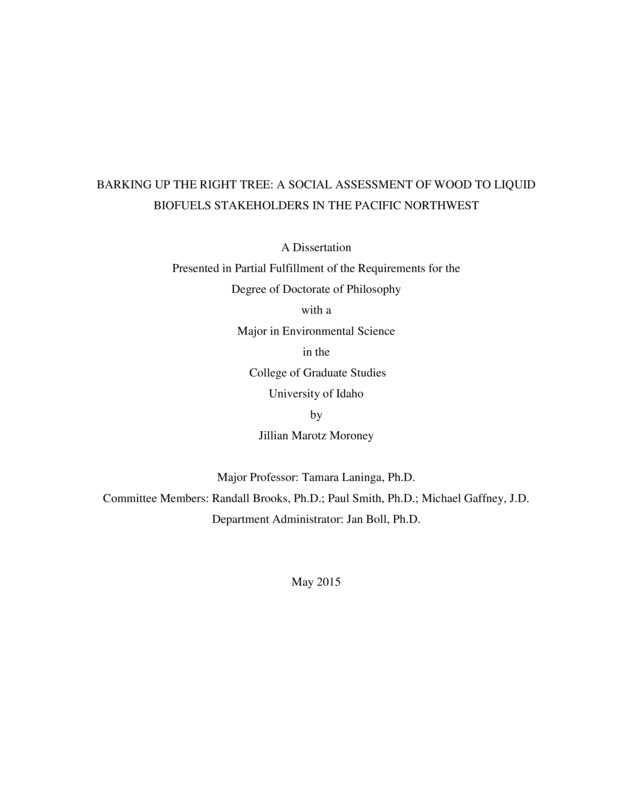BARKING UP THE RIGHT TREE: A SOCIAL ASSESSMENT OF WOOD TO LIQUID BIOFUELS STAKEHOLDERS IN THE PACIFIC NORTHWEST
Moroney, Jillian Leigh. (2015). BARKING UP THE RIGHT TREE: A SOCIAL ASSESSMENT OF WOOD TO LIQUID BIOFUELS STAKEHOLDERS IN THE PACIFIC NORTHWEST. Theses and Dissertations Collection, University of Idaho Library Digital Collections. https://www.lib.uidaho.edu/digital/etd/items/moroney_idaho_0089e_10590.html
- Title:
- BARKING UP THE RIGHT TREE: A SOCIAL ASSESSMENT OF WOOD TO LIQUID BIOFUELS STAKEHOLDERS IN THE PACIFIC NORTHWEST
- Author:
- Moroney, Jillian Leigh
- Date:
- 2015
- Keywords:
- bioenergy biofuels forest health social acceptability stakeholders woody biomass
- Program:
- Environmental Science
- Subject Category:
- Alternative energy; Natural resource management; Area planning and development
- Abstract:
-
With mounting scientific evidence confirming anthropogenic impacts on global climate change, the drive to develop renewable energy sources in order to reduce CO2 emissions is growing. The Northwest Advanced Renewables Alliance (NARA) is a regional public/private consortium in the Northwestern U.S. examining the feasibility of a wood-based liquid biofuels industry. Significant resources have been devoted to investigating the environmental and economic viability of the wood to biofuels supply chain. However, there has been limited research assessing the knowledge, opinions, and perceptions of stakeholders about using woody biomass as a source for biofuels. To address these gaps, we conducted a survey with informed stakeholders in the Northwest. Most survey participants showed a high level of support in general for biomass activities in their region, but show statistically significant differences between support for various forms of feedstock by stakeholder groups. Statistical analysis showed that environmental concerns and perceived benefits both affect the potential level of support for a wood based biofuel supply chain in this region. Respondents were concerned about forest conditions, especially current excess fuel loads; thought that the regional economy would benefit from collecting forest residuals and that removing woody biomass would produce healthier tree stands; and were worried about the negative impacts of a wood-based biofuels industry related to soil degradation, loss of organic material, and loss of wildlife habitat. The survey results also showed stakeholders who feel they know more about using woody biomass to produce liquid biofuels are more supportive of various aspects of the wood to liquid biofuels industry. This information can be used to create and tailor outreach efforts to better target stakeholders that have concerns, worries, and knowledge gaps through the information outlets that are most meaningful and effective to them.
- Description:
- doctoral, Ph.D., Environmental Science -- University of Idaho - College of Graduate Studies, 2015
- Major Professor:
- Laninga, Tamara J
- Committee:
- Brooks, Randal; Smith, Paul; Gaffney, Michael
- Defense Date:
- 2015
- Identifier:
- Moroney_idaho_0089E_10590
- Type:
- Text
- Format Original:
- Format:
- application/pdf
- Rights:
- In Copyright - Educational Use Permitted. For more information, please contact University of Idaho Library Special Collections and Archives Department at libspec@uidaho.edu.
- Standardized Rights:
- http://rightsstatements.org/vocab/InC-EDU/1.0/

